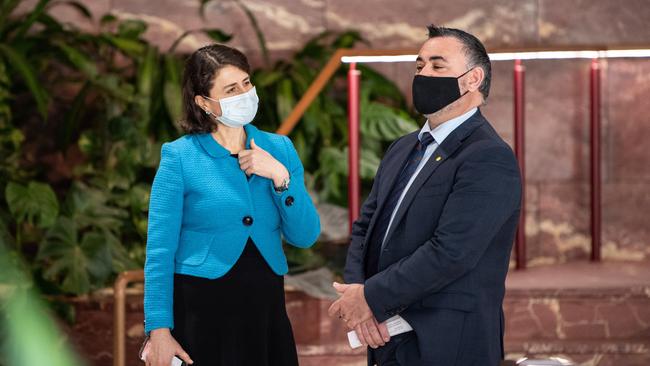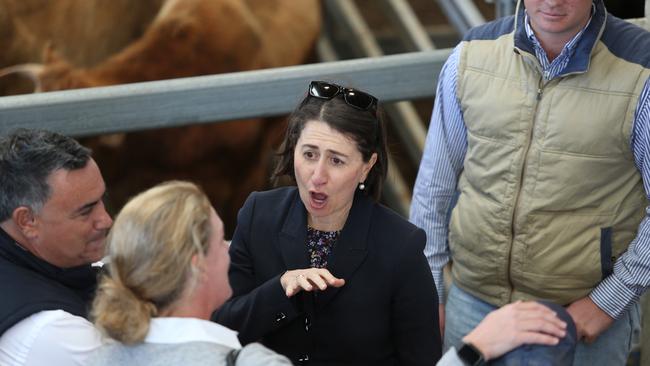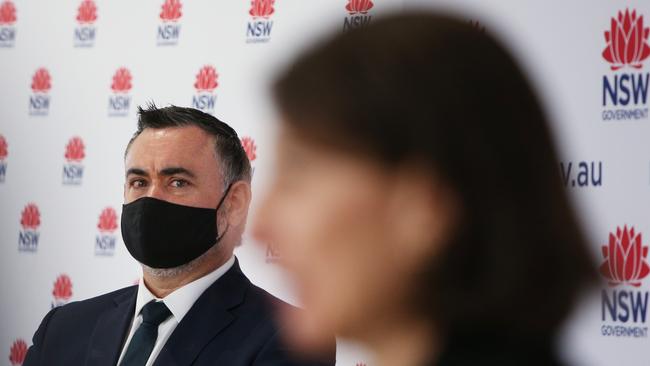Reluctant exit by a moderate who wanted to finish the job
Until the last moment, Gladys Berejiklian didn’t want to go. But she wasn’t going to leave her volatile deputy in charge.

Up until the last moment possible, Gladys Berejiklian did not want to go.
The 45th premier of NSW and first woman to be elected in that position was speaking plainly on Friday – no political spin or dissembling – when she said: “Resigning at this time is against every instinct in my being.”
Berejiklian, 51, is the third Liberal premier ensnared by the state’s corruption body, ICAC, in the climax to a political career that no leader would want.
But in the case of Berejiklian, she leaves in the midst of unfinished business as the leader of a government presiding over unprecedented investment in road and rail infrastructure projects to cope with Sydney’s urban sprawl.
Most oddly of all, Berejiklian’s exit comes at a time when her political standing could not be higher. She had won the hearts of a big majority in the nation’s most populous state, regardless of their party persuasion, because of her calm handling of back-to-back bushfire and pandemic crises.
Elected to the NSW parliament in 2003, Berejiklian was a high achiever who served as transport minister and treasurer in Coalition governments before she was handed the top job, uncontested, after the surprise resignation of Mike Baird in January 2017.
But Berejiklian’s success story is all the more remarkable as the daughter of Armenian migrants whose own parents were left orphaned after the 1915 genocide at the hands of Turkish soldiers.

Growing up in Sydney’s north west, Berejiklian spoke no English until she was five and started school. By her 20s, she had three university degrees under her belt, including a Master of Commerce from the University of NSW, experience in the banking industry and was president of the NSW Young Liberals.
Appointed transport minister in 2011 when the O’Farrell government took office, Berejiklian oversaw the extension of light rail projects and the start of Sydney’s northwest rail link. As treasurer and deputy leader when Baird succeeded Barry O’Farrell, she was responsible for the budget’s return to surplus and NSW becoming debt-free for the first time in 20 years.
As premier after Baird, Berejiklian’s early task was to bed down controversies over a failed ban on greyhound racing and forced council mergers. Her legacy will undoubtedly be the West Connex road project, and others, even if they were a continuation of the Baird era.

While Berejiklian faced scandals involving government ministers, it was her personal connection to disgraced former Liberal MP for Wagga Wagga Daryl Maguire, revealed a year ago at ICAC, that haunted her and ultimately brought her undone.
Whether she is exonerated by ICAC’s new investigation into her own conduct, Berejiklian is likely to be judged at fault for poor judgment over her relationship with Maguire, and for not disclosing it earlier.
Berejiklian endured the constant niggle of rumours for 12 months as some senior government colleagues backgrounded well-placed journalists with various scenarios about her impending exit – after the Maguire relationship was first aired.
Yet Berejiklian was determined to stay, at least until January, possibly longer, believing her public standing was enough to ensure the timing of her exit was her own, with a sense of completion.
In theory, Berejiklian could have stepped aside during the investigation and handed the reigns temporarily to her deputy, John Barilaro. Neville Wran stepped aside during the 1983 inquiry by royal commissioner Laurence Street into allegations Wran improperly influenced the outcome of committal proceedings against former rugby league chairman Kevin Humphrys on misappropriation charges. Wran returned as premier just 2½ months later after Street “completely exonerated” him.
Berejiklian, while protesting she has acted honestly at all times, knew ICAC’s snail pace for investigations presented an insurmountable problem – regardless of how things turn out. Recent ICAC investigations have left members of Berejiklian’s government hanging for two to three years.
There was a possibility that Barilaro, who leads the junior Coalition partner, the Nationals, and is known for his outspoken, sometimes volatile ways, could have been left in charge until the next election due in March 2023.
On that basis alone, Berejiklian felt she needed to go. The uncertainty of a drawn-out corruption investigation was too much.
Next in line as premier is treasurer Dominic Perrottet, under a cross-factional deal with moderate frontbencher Matt Kean. NSW is about to get a taste of politics with a conservative premier who has a “take-no-prisoners” approach to opponents. Gladys-style moderation is over.




To join the conversation, please log in. Don't have an account? Register
Join the conversation, you are commenting as Logout